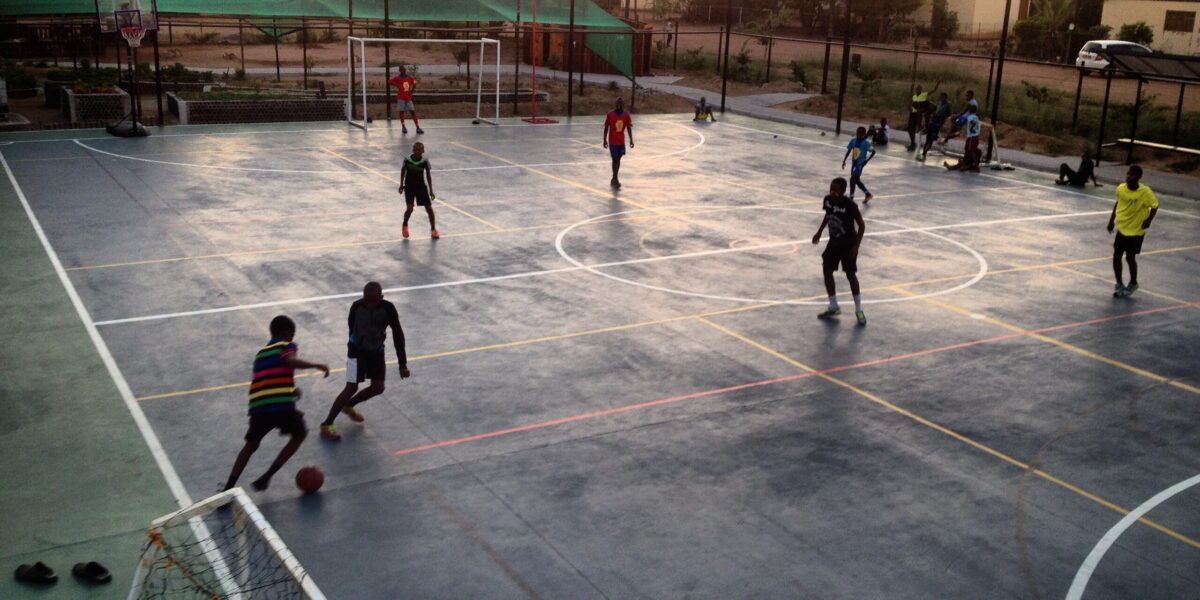Value and potential, within a child’s reach In the middle of Bontleng, Botswana, was once a playground with colorful plants, swings, and shiny new slides. Over the years, the flowers were trampled into dust, the swings broke, and rust took over the slides. The space was crisscrossed with people coming and going to the barber, a car wash, or just sitting in the shade of the lone tree. “This park [was] not safe at night,” said Wame Chiepe, who lives beside the park and works with the Pula Sports Development Association (PSDA). “People [got] robbed; some [got] stabbed. It [was] quite dangerous.”
While Botswana has “amazing infrastructure,” Nathan Dirks explained, poverty often leaves children and young adults without many options and at risk to alcoholism, vandalism, drug abuse, and other negative social behaviors, he said.
Nathan and Taryn have a heart for children of all ages. “In a culture and time that did not necessarily hold children in high regard, [Jesus] took the time to provide children with individual attention, and encouraged his followers to learn from them,” Nathan said. In addition to Bible studies, the Dirks couple knew that they needed other ways to support their young adult friends. Together, with PSDA, they planned to turn this rough part of town into a park for sports, environmental awareness, education, and community gatherings.
Confirming the call
After much prayer and discernment, members of PSDA felt God remind them of the image of Jericho: Joshua leading the people of Israel to the Promised Land. “The park, a place known for vandalism, drunkenness, conflict and crime, was a spiritual stronghold,” wrote Nathan. “Like Jericho, it was surrounded by formidable walls. So, like the Israelites, we knew that we had no chance in this place unless God led us through the barrier.”
They decided they would prayer-walk around the perimeter of the park every day for seven days. They prayed. They listened for discernment. On the second day in the park, Nathan and Taryn noticed a 10-year-old boy who they had never seen before. The boy asked if the rumors were true, if the park would be built.
“In Botswana, conversations about God and spirituality are not seen as strange,” said Nathan. “So we told the boy that we were not yet sure whether the park would be built or not, and that we were asking God to show us what to do.” After hearing their plan for discernment, the boy nodded thoughtfully and agreed to join in the walk around the park’s perimeter.
“As he turned to begin the walk, I realized that we had not learned the name of our new friend,” Nathan said. “Surely, it was Thabo or Kagiso or Lesego—names common in Gaborone. But rather, it was a name we had never heard in Botswana before or since.”
“My name is Joshua,” he said. And with that confirmation, believed to be from God, they moved forward with the park plans.
Community gains wholesome recreation and food
At first glance, the futsal court resembles a cement soccer field for a team of five players. In Botswana, futsal is the reigning game, with basketball and netball also popular. So when the park was designed, they made sure it was equipped for all three sports.
The Dirkses worked with young Botswanans from PSDA to create a permaculture landscape that contains rainwater, prevents erosion, and allows for maximized soil fertility, said Nathan. On what was once a dry and dusty lot, they’ve recently planted dozens of indigenous trees. “[It] will eventually result in a microclimate within the park, an area that is cooler than the surrounding region,” he said.
“Our work at the park has allowed us to see some of the ways that God quietly brings people together, and keeps them together through differences and difficulties when they’re willing to stay focused on him. … A part of the calling was the opportunity to trust in God and learn to work through these issues together,” said Nathan.
Building community
Beyond the allure of fast-paced competition and lush green space lies a deeper reason for the Bontleng Futsal Park. In the rough neighborhood, the park provides a constructive environment that stands in stark contrast to the bars that surround it.
“There are wonderful opportunities for [youth] in Botswana,” said Nathan. “And we hope that with the right encouragement, which we are working to facilitate in a number of ways (educational, social, sporting, environmental, agricultural), they will be able to seek these opportunities without being side-tracked.”
While the futsal court and gardens are already completed, the vision hasn’t stopped. The young adults at PSDA plan to host a market space for local artisans, an outdoor fitness park, and an eco-café (with Wi-Fi) to sell local food and provide a space for after-school tutoring programs. The best part: These gathering spaces will be completely self-sufficient and sustainable, thanks to bio-toilets and solar panels.
“I want to say thank you for your support, back home,” said Wame. “We’re almost done with the park, thanks to God. Thanks to you people. If we could work like this throughout the world, that would be great!”
Walls of healing: As both a symbol of the transformation to come and as an environmental effort, the park’s walls are made with recycled beer bottles worked into beautiful designs.
Sustainable gardens in a dry land
The 7,200-square-foot court will drain more than 100,000 gallons of rain water each year into an underground cistern. That’s more than enough to water the community gardens on site. Along with traditional gardens, the community is trying out several aquaponics gardens, where fish and vegetables grow together. (The fish waste provides nutrients for the plant’s soil, and plants filter the water for the fish.)










